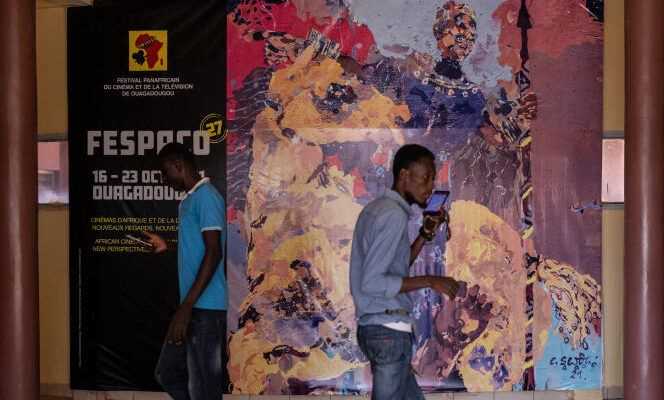Africa’s largest film festival, the Pan-African Film and Television Festival of Ouagadougou (Fespaco), begins Saturday, October 16 in Ouagadougou, capital of Burkina Faso, a country plagued by jihadist violence since 2015 and the pandemic of Covid-19 which resulted in its postponement for eight months.
Both in terms of safety and health, “We are aware of the situation and all arrangements have been made” for a smooth running of Fespaco, which should welcome a thousand festival-goers, told AFP its general delegate, Alex Moussa Sawadogo.
Regarding Covid-19, which affects Burkina Faso in a more limited way than other African countries, the barrier gestures, in particular “Wearing a mask in the rooms” projection, will be required, he said.
The opening ceremony is scheduled for late Saturday afternoon at the Sports Palace in the Ouaga 2000 district, in the presence of Burkinabe President Roch Marc Christian Kaboré. The music stars of Senegal – guest country of honor for the 2021 edition – Baaba Maal and Didier Awadi will perform there, as well as the dancers of Burkinabe choreographer Serge Aimé Coulibaly.
A traveling “mini Fespaco”
Until the announcement of the winners on October 23, film screenings will take place in the various theaters of Ouagadougou, including that of the 1,066-seat Neerwaya cinema. But screenings will also take place in “Ten outdoor spaces”, including a converted Place de la Nation, one of the largest in the city, said Mr. Sadawogo.
The general delegate announced that after the official festival, a “Mini Fespaco” itinerant will take place in northern Burkina Faso most affected by jihadist attacks which, in six years, have left around 2,000 dead and 1.4 million displaced.
The festival also opens the day after the commemoration of the 34th anniversary of the assassination of former President Thomas Sankara, “Father of the revolution” Burkinabe who became a pan-African icon on October 15, 1987. He was 37 years old and only ruled his country for four years.
The trial of his alleged killers in a coup that brought to power Blaise Compaoré, now in exile in Côte d’Ivoire since his fall in 2014, opened on Monday in his absence and was suspended. until October 25.
Seventeen feature films in competition
A documentary titled Thomas Sankara, the human, by Burkinabé journalist Richard Tiéné, was selected. Seventeen films will compete for the grand prize of the festival which was initially scheduled for February 27 to March 6 and postponed due to the Covid-19 pandemic, a second wave of which then hit the country.
Out of 1,132 films registered, 17 were selected in the fictional feature film category, to compete for the supreme award, the Yennenga Gold Standard. The directors of these films in the running come from fifteen countries of the continent, including two Egyptians and a Burkinabé.
The others are from Senegal, Angola, Cameroon, Nigeria, Tanzania, Somalia, Côte d’Ivoire, Chad, Rwanda, Morocco, Namibia, Lesotho and Tunisia. Finally, a Haitian film was also selected.
Twenty-nine short films – fiction and documentaries – including five from Burkina Faso and four from Senegal, as well as seventeen TV series were also selected for the official selection.
Fespaco is held every two years in Ouagadougou and each edition sees films of all formats compete for the Gold Standard. Since 1969, the date of its creation, it has brought together tens of thousands of spectators and actors from the world of the seventh art in the Burkinabe capital.
For this 27e edition, the “African and diaspora cinemas: new perspectives, new challenges” will be in the spotlight. The Gold Standard is awarded by an international jury chaired by Mauritanian director and producer Abderrahmane Sissako, winner of the César for best film for Timbuktu in 2015.
To stay up to date with African news, subscribe to the “World Africa” newsletter from this link. Every Saturday at 6 a.m., find a week of current events and debates treated by the editorial staff of World Africa.
